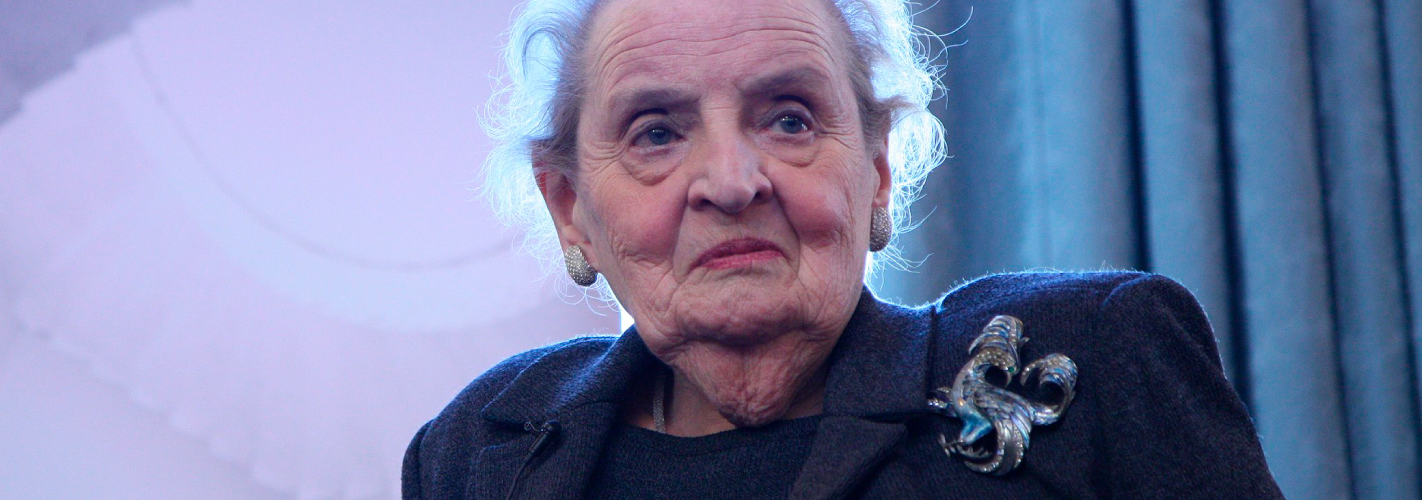“It took me quite a long time to develop a voice. And now that I have it, I am not going to be silent.” –Madeleine K. Albright
As we close out Women’s History Month, it is appropriate to pause and remember a woman who was an immigrant, became a citizen, achieved academic credentials, and was eventually elevated to one of the highest positions in government and in doing so, shattered the “so-called” glass ceiling. Secretary Albright was a force to be reckoned with and regardless of position was respected by both sides of the aisle. When Secretary Albright spoke, and opined on foreign relations, which she did until the end, the world listened. I was privileged to have met her when I did.
March is a time for spring, daylight savings time, St. Patricks’s Day, the “ides of March,” and last but not least, Women’s History Month. This annual month-long celebration highlights the contributions women have made to our nation at all levels of society; the theme for 2018 is “Our History Is Our Strength.”
Since 1988, US presidents have issued proclamations designating March as Women’s History Month. It is a reminder to men and women to recall the past and the challenges of inequality, to celebrate the achievements of the present, and to look ahead to the contributions yet to come.
Women have had a long and underappreciated history, but the roles of women have evolved in recent times. Just think: The cumulative progress women have made in the fields of art, business, entrepreneurship, finance, literature, law, politics, science, and the military is an impressive list of accomplishments.
We are no longer trailblazers in a remarkable list of “firsts.” The first to fly, the first to vote, the first to be elected, the first doctor or lawyer, the first to discover cures in medicine or solve problems in mathematics or science, the first to serve in the highest levels of government, or the first to break gender barriers and stereotypes in the military.
Women as mothers, daughters, sisters, wives, and warriors have selflessly answered the call of duty to our country both in and out of uniform. Many are not famous, although some names you know. “In grim situations and under austere conditions women have persevered, standing tall.” Fully leveraging their influence, power, and intelligence, it is their courage and sacrifice that has often changed the course of individual lives, as well as the course of history.
One such “first” history-maker was Czechoslovakia-born Madeleine Albright, who became the first foreign-born woman to serve in the cabinet when she was appointed the 64th secretary of state (1997-2001). Her appointment also made her the highest-ranking female cabinet member at that time.
Participating with a group of classmates at an international law conference in Den Hague, The Netherlands, we were invited to a private reception at the US embassy. There I had an opportunity to speak with Secretary Albright in a personal setting. She spoke freely, and I learned about her rise to the highest levels in government.
Madeleine spent World War II in London subjected to The Blitz. She spent a lot of time in air-raid shelters. After the war, her father became an ambassador to Yugoslavia. Her parents’ families had been well to do in their lives, but they came to America as immigrants. Her wish was to become an American, and she became a US citizen in 1957.
Madeleine went to Wellesley College (class of ’59), and not only did it make a difference, but she also got an excellent education. She got used to leading as president of the student body and editor of the newspaper. Madeleine completed her education at Columbia University, earning a certificate in Russian studies in 1968 and her MA and PhD in public law and government by 1976.
“Leaders are made by the situations they are involved in. I think that some rise to the occasion and some do not.”
When her name came up to be secretary of state, people said that a woman couldn’t be secretary, but she proved them wrong. The challenge was not so much how foreign leaders would regard her because they knew she was representing the United States, but instead, she had to prove herself to the “old boy network” in our own government.
As secretary of state, Madeleine Albright had a substantial impact and influence on American diplomacy. Some of her achievements included “the promotion and expansion of NATO eastward, non-proliferation of nuclear weapons, furthering normalization with Vietnam, and pressing successfully for military intervention under NATO during the humanitarian crisis in Kosovo.”
In a recent interview, she said, “People often ask very successful women, ‘How do you do everything?’ There is no formula for anything, but I do think that women’s lives come in segments. You don’t have to do everything all at once.”
She went on to say, “One of the most important messages to women is that it’s a wonderful time of opportunity, but don’t forget how hard it’s been. We need to respect each other, and we need to help each other.”
From politics to industry to warriors on the battlefield, our history is our strength.
This article was first published in 2018.

















